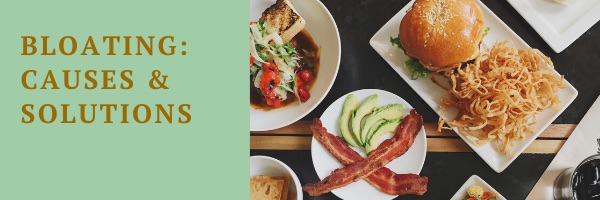Our digestive system is one long tube starting from the mouth and ending at the anus. Anything you do in any part of the gut will have an effect downstream. I have had many clients complain about bloating, I myself have experienced bloating occasionally depending on what I have eaten. Occasional bloating is acceptable but if it becomes chronic then it is time to address the issue. As with any chronic symptom, the first thing is to have it checked out with your medical doctor to ensure there are no underlying conditions that need to be treated. If you have received clearance from your doctor but are still experiencing bloating then its time to consider some lifestyle changes that could help alleviate this problem
Bloating is caused by the excess production of gas. Our human cells don’t produce gas but the bacteria that live inside our gut are the ones who produce gases such as hydrogen and methane. These bacteria are not always bad, in fact, most of them are our friends. They help us digest food, support our immune system and do many other useful functions for us. Most of these are supposed to be in the large intestines. They are excreted in large numbers during a bowel movement and they continue to proliferate and divide in the large intestines. Sometimes they can over grow and if that overgrowth is in the small intestine (sometimes called SIBO), it can lead to bloating. Quite often people turn to probiotics to relieve all digestive issues but if you have an overgrowth of bacteria especially in the small intestines, using a probiotic to relieve bloating is not always a good idea.
There is a fine balance in the gut ecology between the good and the bad microorganisms and when that balance is tipped, annoying symptoms of the gut occur and when it remains tipped for a long period of time, chronic illnesses can appear.
The question then is why are the bacteria overgrowing in the small intestine in the first place. One of the reasons is that our gut motility is compromised. Our gut muscles go through a rhythmic muscular movement (known as peristalsis) to push the food along the long tube. This movement also pushes the bacteria along leading to their excretion from the gut (that’s why our stools contain bacteria). It maintains that fine balance of bacteria in the gut and when that motility is compromised, we can end up with an overgrowth of bacteria in our small intestine which can then lead to bloating.
So what can you do to improve this gut motility and reduce bloating? Here are 5 tips to help you
- Cut down on snacking in between meals: Our digestive tracks need to sweep out excess food and this activity called Migrating motor complex (MMC) is only initiated after 3-4 hours of NOT eating. If we are constantly eating then our MMC activity is minimized and it can lead to overgrowth of bacteria.
- Increase ginger in your diet either by adding it to food or drinking it in tea. Ginger is a natural product that works as a potent regulator of gut motility.
- There is a chemical called d-limonene that is found in the rind of lemons and other citrus fruits. It works to increase the gut motility and is also an antibacterial and antifungal. If you suffer from bloating, try having some tea with ginger and lemon.
- Keeping a food-symptom diary will help you identify food items that cause bloating. Foods which are high in certain types of carbohydrates (known as FODMAPS) can cause bloating. Dairy products can often cause bloating if you are not able to digest the sugars found in milk. The idea isn’t to avoid all foods forever but to find out which foods cause bloating and avoid them short term while you fix the gut imbalance and motility issues.
- Reduce sugar. Sugar feeds the bad bacteria and leads to overgrowth of these bacteria which then leads to bloating and other digestive issues. So while you are trying to fix the gut imbalance, cutting down sugar is a great idea.

